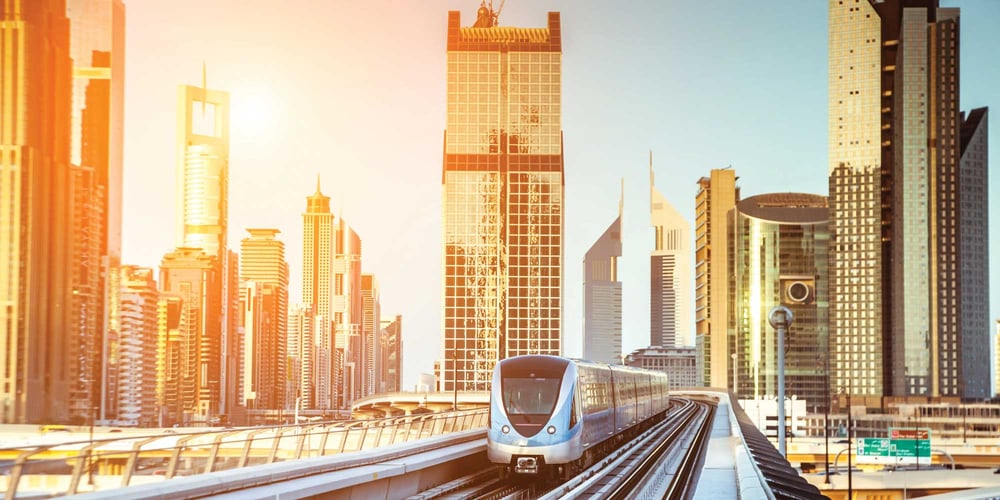Dubai utilities cost
Home utilities in Dubai consist of both water and electricity connections, which are managed by the DEWA (Dubai Electricity and Water Authority). The average monthly bill may differ across seasons, with a spike during summer due to A/C usage. Below is a general range of what one may expect to spend for utilities for a one-bedroom apartment.
|
Utilities |
Cost of rent per month |
|
Electricity |
AED 200 - AED 400 (USD 55 - USD 110) |
|
Water |
AED 50 - AED 100 (USD 13 - USD 26) |
|
Cooling and Heating |
AED 150 - AED 300 (USD 41 - USD 82) |
Dubai residential cleaning services
Cleaning services for accommodations also fall under the housing category in living expenses. This service is usually provided by hiring domestic help which is quite common in Dubai. The rates vary depending on the basis of cleaning but typically a full-time domestic helper would expect a salary range of AED 1,500 to AED 4,000 (USD 408 - USD 1090) per month (dependent on factors such as live-in, live-out) and a part-time domestic helper that comes in once a week (3-hour service) would cost around AED 360 to AED 480 (USD 98 to USD 130) per month.
Dubai education costs
Public schools
While expat kids are allowed to attend both public and private schools in the UAE, they must pay fees regardless of which type they select, as free government schooling is only available for Emirati nationals. For expats interested in public schools, the annual tuition fee has been capped at AED 6,000 (USD 1,635) per year.
International / Private schools
Dubai has 209 private schools servicing 289,195 Emirati and expat students. Out of all the emirates Dubai is the only one that has implemented annual tuition caps forbidding schools from increasing their rates at unreasonable amounts every year. Private school fees can range between AED 12,723 to AED 64,903 (USD 3,464 - USD 17,671).
It must be noted that school fees also depend highly on the school location, it varies with a significant deviation, and a complete overhaul can be seen here.
Higher education
Dubai has 65 colleges and universities, and 5 public universities. They cater to both Emirati and expatriate students. However, public universities in Dubai use Arabic as the medium of teaching whilst most private universities teach using English. The average cost for an undergraduate degree would range from AED 40,000 to AED 100,000 (USD 10,890 - USD 27,226) per academic year. The average cost for a graduate degree would range from AED 50,000 to AED 120,000 (USD 13,613 to USD 32,671) per academic year.
Housing fees for university students vary from AED 5,000 to AED 15,000 (USD 1,361 - USD 4,084) per academic year.
For a full breakdown on Dubai University fees, click here.
Dubai transportation costs

Car ownership
The cost of buying a car greatly depends on the condition. To give a benchmark, the 2024 Toyota Corolla is the most commonly driven car in the UAE and fetches a price of AED 74,900 (USD 20,392). Implementing a 20% deposit, a 60-instalment payback plan, and considering other costs, it would come in at AED 14,076 (USD 3,832) per year excluding the down payment. However, when buying a used car, depreciation usually takes 20-40% off the total price of the car. As of 2024, a used 2020 Toyota Corolla (4 years old) fetches an average price of AED 40,000.
The petrol price in Dubai as of December 2024 varies from AED 2.63 (USD 0.72) per litre for Special 95 to AED 2.74 per litre for Super 98 (USD 0.75), which is significantly cheaper than the worldwide average of AED 4.55 (USD 1.24) per litre.
Public transportation
|
Transportation fares/Prices in Dubai |
Average cost |
|
Cost of Taxis in Dubai Minimum Starting Tariff Per additional 1 km |
AED 12.00 (USD 3.27) AED 2.5 (USD 0.68) |
|
Buses (single ticket) Within 1 Zone 2 Adjacent Zones More than 2 Zones |
AED 4 (USD 1.09) AED 6 (USD 1.63) AED 8.50 (USD 2.31) |
|
Buses (monthly ticket) For 1 Zone For 2 Zones For all Zones |
AED 140 (USD 38.12) AED 230 (USD 62.62) AED 350 (USD 95.29) |
|
Average price of 1 L petrol |
AED 2.66 (USD 0.72) |
Data from Numbeo (Most updated statistics: November 2024)
In the JLT area, there are two Dubai Metro stations making it extremely convenient for employees, residents and visitors to access areas in the premium district, DMCC. There is also a bus service that travels around the community with stops throughout.
For more information on public transportation in Dubai, you can visit the Dubai government's official website.
Dubai healthcare & insurance
Dubai Health Authority has implemented legislation where all residents, including expats, must have private medical insurance. While locals can be covered under the government-funded scheme, expats will need to be covered under private health insurance schemes, which are usually purchased through their employers.
Dubai is especially recognised for its high-standard healthcare system. As an expat, you can take advantage of both public and private healthcare facilities.
Health Card
While Dubai’s medical public facilities are free for locals, expats can receive a 50% discount with a health card. Health card fees are as follows:
- Expatriate Fee up to 10 years – AED 120 (USD 32.67)
- Expatriate Fee from 18 and above – AED 320 (USD 87.12)
- Nationals Fee up to 10 years – AED 25 (USD 6.81)
- Nationals Fee from 18 and above – AED 120 (USD 32.67)
The above fees are one-time payments to obtain a health card. Health cards must be reissued in place of an expired one (dependent on age). To apply for a health care card, expats can visit the Dubai Health Authority website.
The Essential Benefit Plan
There’s also something in place for employees earning less than 4,000 AED (USD 1,090) monthly or non-working residents. Launched in 2014, the Essential Benefits Plan (EBP) is the minimum level of health insurance cover that all residents in Dubai must have. It provides essential benefits at affordable prices. Below is a breakdown of the annual premium package fee for an EBP based on gender, job and age:
- Employees: AED 650-725
- Dependents (aged 0-65): AED 650
- Non-working married females (aged 18-45): AED 1,600
- Elderly parents: AED 2,500
- General domestic help: AED 650
For more information, please visit Pacific Prime’s guide to mandatory health insurance in Dubai.
Job Loss Insurance
Dubai now offers expats an extra layer of financial protection against sudden job loss. The Involuntary Loss of Employment (ILOE) scheme, effective from 2023, provides income protection for the first three months after an unexpected job loss.
The insurance premiums for the ILOE scheme are affordable and tiered according to your basic salary:
- For salaries up to AED 16,000 (4,355 USD):
- AED 5 (USD 1.36) per month/AED 60 annually (USD 16.33)
- For salaries more than AED 16,000 (4,355 USD):
- AED 10 (USD 2.72) per month/AED 120 annually (USD 32.67)
Only Dubai Insurance is authorized to issue ILOE policies. Subscribers can receive 60% of their average basic salary over the last six months before job loss, paid within two weeks from the date of the claim.
So, as an expat looking to make your way in Dubai, the ILOE scheme offers you a greater sense of security as you navigate the city's vibrant professional landscape. It's not just the luxury lifestyle that makes Dubai appealing, it's also the comprehensive social support structures like the ILOE.
Beyond cost considerations: Dubai's quality of life
Though Dubai has seen an increase in cost of living over 2024, it has still retained a top spot in it's quality of life, according to Mercer. Mercer classifies a "high" quality of life with personal safety and security, along with an abundance offering of amenities and services that are easily accessible by citizens. Dubai has often been classified as "one of the safest cities in the world", while amenities and infrastructures on offer in JLT, Uptown Dubai, and all around Dubai make it easy for newcomers to truly call Dubai home.
What salary do you need to live in Dubai?
The amount you will need depends on your lifestyle, but a budget of AED 16,000 to AED 30,000 is typically sufficient for most international employees settling in Dubai.
Average salaries by profession
|
Profession |
Average salary per month |
|
Investment Banking Analyst |
AED 25,800 (USD 7,024) |
|
Chef |
AED 9,250 (USD 2,518) |
|
Project Manager |
AED 20,500 (USD 5,581) |
|
Teacher |
AED 12,400 (USD 3,376) |
|
Human Resources Manager |
AED 24,100 (USD 6,561) |
|
Business Analyst |
AED 19,300 (USD 5,254) |
Data from Time Doctor
Salary progression related to years of work experience
One key advantage of building a long-term career in Dubai is the substantial salary growth that comes with increased experience. Professionals who stay longer in the city often benefit from higher salary increments, making it financially rewarding to commit to the local job market. Over time, salaries increase significantly as individuals gain more experience and expertise, offering greater financial stability and opportunities for savings and investments.
|
Years of experience |
Salary increment (%) |
|
2-5 Years |
32% more than junior professionals |
|
5 - 10 Years |
36% more than those with less than 5 years of experience |
|
10-15 Years |
21% more than those with less than 10 years of experience |
Source from Zimyo
Living in Dubai: Can you make it work?
Despite a rise in the cost of living in 2024, Dubai continues to stand out as a leading destination for international professionals. Compared to other top expat hubs like Hong Kong, Singapore, and New York, Dubai remains more affordable and offers a higher quality of life, solidifying its appeal for those looking to advance their careers or establish businesses. Before making the move, learn about what Dubai offers on our JLT website including resources and tips on the best gyms, restaurants, entertainment and facilities in Dubai’s premier neighbourhood, Jumeirah Lake Towers. While Dubai leads in global recognition, neighbouring cities like Abu Dhabi and Sharjah also present unique living opportunities.
Thinking of moving to Dubai for business? If you want to learn more, download our free 'Dubai Business Setup Guide’ to learn everything you need to know about moving and setting up in the right free zone.


